2015年9月12日PETS 2 真题听力
2015年高考英语全国2卷听力
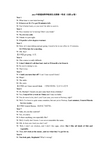
2015年普通高等学校招生全国统一考试(全国II卷)Text 1W: What time is your train leaving?M: It leaves at 10. I’ve got 50 minutes left.W: You’d better hurry, or you won’t be able to catch it.Text 2M: Nice weather we’re having! Don’t you thi nk?W: No, it is too cold.M: I think it is just right.W:I’d prefer a few degrees warmer.Text 3M: Now, let’s stop talking and get going. I need to be in my office in 15 minutes.Or I’ll be late for a meeting.W: OK. Bye!【注释】get going 出发Text 4M: This course is really difficult.W:I don’t think it’s all that bad. And we’ll benefit a lot from it.M: So you’re taking it, too.W: That’s true.Text 5W: Could you turn that off? I can’t hear myself think!M: What?W: The radio.M: Oh, sorry.【注释】can’t hear oneself think (受噪音影响) 无法专心思考Text 6W: Hi, Michael! I heard you just came back from a holiday?M: Yes. I stayed for a week in China and 5 days in India.W: You do travel a lot, don’t you? Last year, you went to Norway, right?M: Well, I’ve been to qui te some countries, but not yet to Norway. Last summer, I toured Russia for two weeks.【注释】I toured Russia. 我参观了俄罗斯。
【精品】2015二级英语听力模拟试题(一)

Text 3 M: He shoots…and he Ahhhhhhh… W: All right, honey. Enough basketball. It’s almost time for dinner. Go upstairs and wash your hands, please. M: Aw, Mom, just five more minutes, OK? 3. What does the woman ask the boy to do? B A. Turn off the TV in five minutes. B. Wash his hands upstairs. C. Sit down for dinner right away. 解析:该题为简单细节题。从女士所说知道答案是B.
9. What did the man suggest the woman do? C A. Try another café . B. Go to the corner market. C. Call Room Service. 解析:该题依然是细节题,从男士问话have you tried Room Service可以看出他的建议。 10. When does the conversation probably take place? A A. Late at night. B. In the middle of the day. C. In the afternoon. 解析:该题是稍有难度的推断题,从女士一开始说要喝 点东西帮她入睡可判断时间可能是晚上,到对话后面男 士说This café is the only place that’s open around here. I’m afraid this part of town closes pretty early.则可以肯定 答案是A.
历年PETS二级听力真题及答案
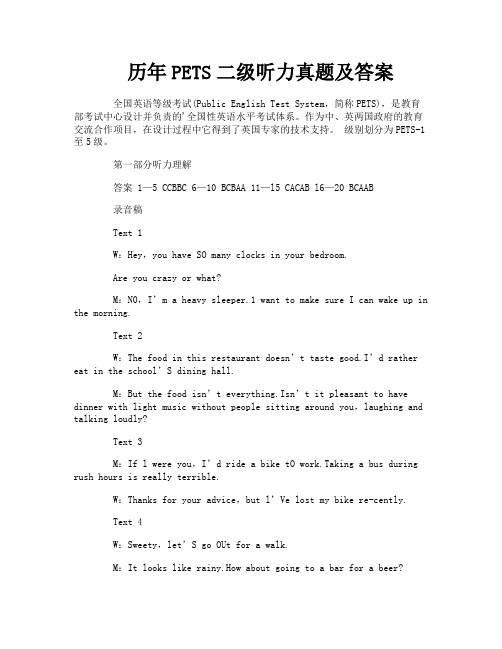
历年PETS二级听力真题及答案全国英语等级考试(Public English Test System,简称PETS),是教育部考试中心设计并负责的'全国性英语水平考试体系。
作为中、英两国政府的教育交流合作项目,在设计过程中它得到了英国专家的技术支持。
级别划分为PETS-1至5级。
第一部分听力理解答案 1—5 CCBBC 6—10 BCBAA 11—l5 CACAB l6—20 BCAAB录音稿Text 1W:Hey,you have SO many clocks in your bedroom.Are you crazy or what?M:N0,I’m a heavy sleeper.1 want to make sure I can wake up in the morning.Text 2W:The food in this restaurant doesn’t taste good.I’d rather eat in the school’S dining hall.M:But the food isn’t everything.Isn’t it pleasant to have dinner with light music without people sitting around you,laughing and talking loudly?Text 3M:If l were you,I’d ride a bike tO work.Taking a bus during rush hours is really terrible.W:Thanks for your advice,but l’Ve lost my bike re-cently.Text 4W:Sweety,let’S go OUt for a walk.M:It looks like rainy.How about going to a bar for a beer?W:But I can’t drink beer with the medicine l’m tak-ing.Why not go to a movie?M:I would rather watch a video online.Text 5W:I’d like tO have my car serviced,the engine and wheels checked.How long will that take?M:Oh,well,it’S rather late.I’m afraid it’11 take hours.You have to have it done in the morning,but we can lend you a car like yours free of charge.You call take it now.Text 6W:What’S going on between you and Charlie?Did you have a fight or something?M:N0,but I can’t stand him anymore.He is the worst roommate l’ve ever had.He never cleans up after himself and he is always listening to loud music when I try to get some sleep.W:Why don’t you have a heart—t0—heart talk with him?M:I’ve tried,but it didn’t work.Maybe you can talk tohim.After all,you are his good friend.Text 7M:Hi,Sue,it’S me.W:Well,hell0,where have you been all day,Steve?Mr.Smith asked me this morning where you were but he didn’t seem to be looking for you or anytl:1ing.M:What did you say?W:I told him that I didn’t know.He seemed very busy as manager always are.Are you OK?M:I’m sorry.I didn’t call you this mornin9.I’ve had a cold since Saturday.I haven’t eaten mtlch these days and it has made me feel really weak.but l’llprobably be there tomorrow.W:All right.We’U go on a business trip next week and don’t worry.You should go to see a doctor,Steve.M:Thanks,but l’Ill getting better now.W:Take care then,bye.M:Bye bye,Sue.Text 8W:0K,tell me about yourself.M:Well,last year in school I played on the football team.It kept me busy。
公共英语等级考试_2015年9月公共英语二级考试真题及答案
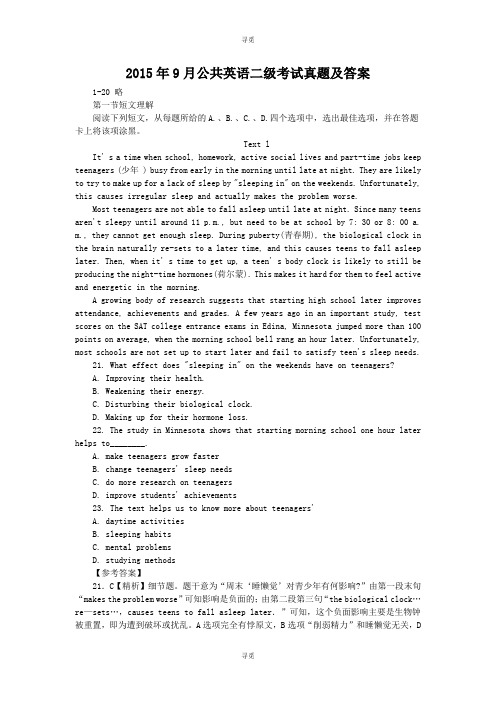
2015年9月公共英语二级考试真题及答案1-20 略第一节短文理解阅读下列短文,从每题所给的A.、B.、C.、D.四个选项中,选出最佳选项,并在答题卡上将该项涂黑。
Text lIt' s a time when school, homework, active social lives and part-time jobs keep teenagers (少年 ) busy from early in the morning until late at night. They are likely to try to make up for a lack of sleep by "sleeping in" on the weekends. Unfortunately, this causes irregular sleep and actually makes the problem worse.Most teenagers are not able to fall asleep until late at night. Since many teens aren't sleepy until around 11 p.m., but need to be at school by 7: 30 or 8: 00 a. m., they cannot get enough sleep. During puberty(青春期), the biological clock in the brain naturally re-sets to a later time, and this causes teens to fall asleep later. Then, when it' s time to get up, a teen' s body clock is likely to still be producing the night-time hormones(荷尔蒙). This makes it hard for them to feel active and energetic in the morning.A growing body of research suggests that starting high school later improves attendance, achievements and grades. A few years ago in an important study, test scores on the SAT college entrance exams in Edina, Minnesota jumped more than 100 points on average, when the morning school bell rang an hour later. Unfortunately, most schools are not set up to start later and fail to satisfy teen's sleep needs.21. What effect does "sleeping in" on the weekends have on teenagers?A. Improving their health.B. Weakening their energy.C. Disturbing their biological clock.D. Making up for their hormone loss.22. The study in Minnesota shows that starting morning school one hour later helps to________.A. make teenagers grow fasterB. change teenagers' sleep needsC. do more research on teenagersD. improve students' achievements23. The text helps us to know more about teenagers'A. daytime activitiesB. sleeping habitsC. mental problemsD. studying methods【参考答案】21.C【精析】细节题。
2015年9月公共英语二级考试真题及答案(阅读)
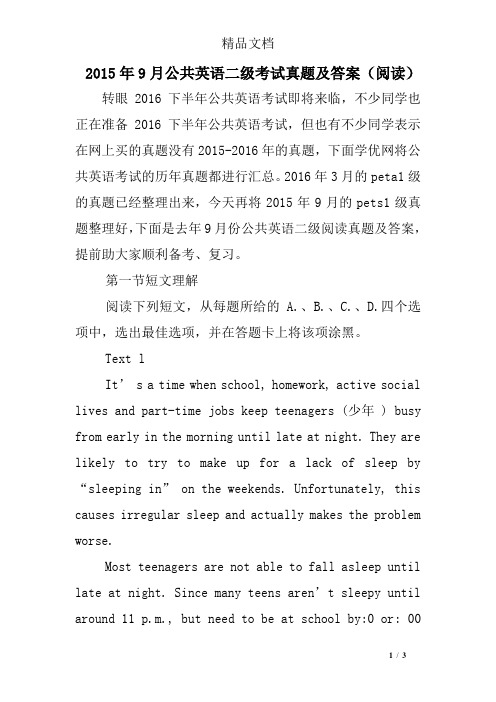
2015年9月公共英语二级考试真题及答案(阅读)转眼2016下半年公共英语考试即将来临,不少同学也正在准备2016下半年公共英语考试,但也有不少同学表示在网上买的真题没有2015-2016年的真题,下面学优网将公共英语考试的历年真题都进行汇总。
2016年3月的peta1级的真题已经整理出来,今天再将2015年9月的pets1级真题整理好,下面是去年9月份公共英语二级阅读真题及答案,提前助大家顺利备考、复习。
第一节短文理解阅读下列短文,从每题所给的 A.、B.、C.、D.四个选项中,选出最佳选项,并在答题卡上将该项涂黑。
Text lIt’ s a time when school, homework, active social lives and part-time jobs keep teenagers (少年 ) busy from early in the morning until late at night. They are likely to try to make up for a lack of sleep by “sleeping in” on the weekends. Unfortunately, this causes irregular sleep and actually makes the problem worse.Most teenagers are not able to fall asleep until late at night. Since many teens aren’t sleepy until around 11 p.m., but need to be at school by:0 or: 00a. m., they cannot get enough sleep. During puberty(青春期), the biological clock in the brain naturally re-sets to a later time, and this causes teens to fall asleep later. Then, when it’ s time to get up, a teen’ s body clock is likely to still be producing the night-time hormones(荷尔蒙). This makes it hard for them to feel active and energetic in the morning.A growing body of research suggests that starting high school later improves attendance, achievements and grades. A few years ago in an important study, test scores on the SAT college entrance exams in Edina, Minnesota jumped more than 100 points on average, when the morning school bell rang an hour later. Unfortunately, most schools are not set up to start later and fail to satisfy teen’s sleep needs.1. What effect does “sleeping in”on the weekends have on teenagers?A. Improving their health.B. Weakening their energy.C. Disturbing their biological clock.D. Making up for their hormone loss.2. The study in Minnesota shows that startingmorning school one hour later helps to________.A. make teenagers grow fasterB. change teenagers’ sleep needsC. do more research on teenagersD. improve students’ achievements3. The text helps us to know more about teenagers’12345免责声明:本文仅代表作者个人观点,与本网无关。
(完整版)2015高考英语全国卷2听力材料

Dialog 7
M: Sally, do you like seafood?
W: Yes, of course.
Dialog 2: M: Nice weather we’re having! Don’t
you think? W: No, it is too cold. M: I think it is just right. W: I’d prefer a few degrees warmer.
Dialog 3
M: Well, it’s Wednesday today. Why don’t you talk to Ms. Jenkins and ask if you can hand it in on Friday morning?
W: Maybe I should try. I guess I just need a good sleep. Thanks, Gorge.
M: If you need any help for the report, just let me know.
Dialog 9
W: Anything interesting in the paper today, dear?
M: Well, yeah. There are a few here that might interest us. Here is one for just four hundred dollars. It only has one bedroom, but it sounds nice, near Lake Street.
全国英语等级考试二级听力真题(及答案)
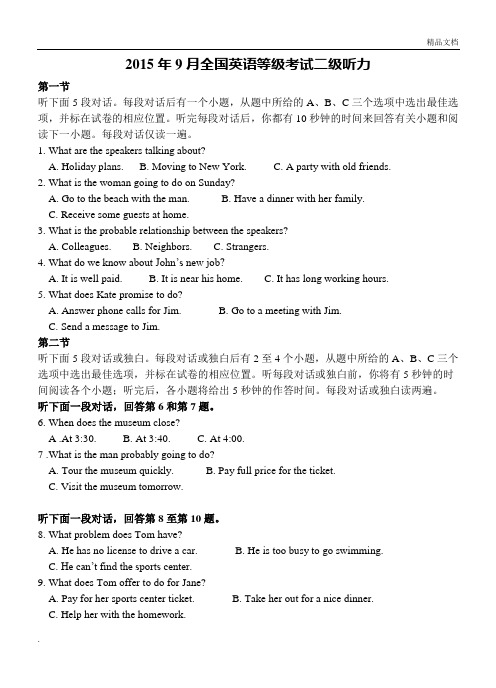
2015年9月全国英语等级考试二级听力第一节听下面5段对话。
每段对话后有一个小题,从题中所给的A、B、C三个选项中选出最佳选项,并标在试卷的相应位置。
听完每段对话后,你都有10秒钟的时间来回答有关小题和阅读下一小题。
每段对话仅读一遍。
1. What are the speakers talking about?A. Holiday plans.B. Moving to New York.C. A party with old friends.2. What is the woman going to do on Sunday?A. Go to the beach with the man.B. Have a dinner with her family.C. Receive some guests at home.3. What is the probable relationship between the speakers?A. Colleagues.B. Neighbors.C. Strangers.4. What do we know a bout John’s new job?A. It is well paid.B. It is near his home.C. It has long working hours.5. What does Kate promise to do?A. Answer phone calls for Jim.B. Go to a meeting with Jim.C. Send a message to Jim.第二节听下面5段对话或独白。
每段对话或独白后有2至4个小题,从题中所给的A、B、C三个选项中选出最佳选项,并标在试卷的相应位置。
听每段对话或独白前,你将有5秒钟的时间阅读各个小题;听完后,各小题将给出5秒钟的作答时间。
每段对话或独白读两遍。
听下面一段对话,回答第6和第7题。
(完整word)2015高考全国卷2英语真题

2015 年普通高等学校招生全国统一考试英语本试卷分第I 卷(选择题)和第H 卷(非选择题)两部分。
考试结束后,将本试卷和答题卡一并交回。
第I 卷注意事项:1. 答第I 卷前,考生务必将自己的姓名、准考证号填写在答题卡上。
2. 选出每小题答案后, 用铅笔把答题卡上对应题目的答案标号涂黑。
如需改动, 用橡皮擦干净后, 再选涂其他答案标 号。
不能答在本试卷上,否则无效。
第一部分 听力(共两节,满分 30 分) 做题时,先将答案标在试卷上。
录音内容结束后,你将有两分钟的时间将试卷上的答案转涂到答题卡 上。
第一节(共 5 小题;每小题 1.5 分,满分 7.5 分)听下面5段对话。
每段对话后有一个小题,从题中所给的A 、BC 三个选项中选出最佳选项,并标在试卷的相应位置。
听完每段对话后,你都有 10 秒钟的时间来回答有关小题和阅读下一小题。
每段对话仅 读一遍。
例: How much is the shirt?5. What does the woman want the man to do A. Speak louder B. Apologize to her.C. Turn off the radio.第二节 (共 1 5小题;每小题 1.5 分,满分 22.5 分) 听下面5段对话或独白。
每段对话或独白后有几个小题,从题中所给的A 、B 、C 三个选项中选出最佳选项,并标在试卷的相应位置。
听每段对话或独白前,你将有时间阅读各个小题,每小题 5秒钟;听完后,各小题将给出 5秒钟的作答时间。
每段对话或独白读两遍。
听第 6 段材料,回答第 6、 7 题。
6. How long did Michael stay in China? A. Five days. B. One week. C.Two weeks. 7. Where did Michael go last year? A. Russia.B. Norway.C. India.A. £ 19.15B. £ 9.18答案是 C 。
- 1、下载文档前请自行甄别文档内容的完整性,平台不提供额外的编辑、内容补充、找答案等附加服务。
- 2、"仅部分预览"的文档,不可在线预览部分如存在完整性等问题,可反馈申请退款(可完整预览的文档不适用该条件!)。
- 3、如文档侵犯您的权益,请联系客服反馈,我们会尽快为您处理(人工客服工作时间:9:00-18:30)。
2015年9月全国英语等级考试(第二级)第一节1. What are the speakers talking about?A. Holiday plans.B. Moving to New York.C. A party with old friends.2. What is the woman going to do on Sunday?A. Go to the beach with the man.B. Have a dinner with her family.C. Receive some guests at home.3. What is the probable relationship between the speakers?A. Colleagues.B. Neighbors.C. Strangers.4. What do we know about John’s new job?A. It is well paid.B. It is near his home.C. It has long working hours.5. What does Kate promise to do?A . Answer phone calls for Jim. B. Go to a meeting with Jim. C. Send a message to Jim.第二节听下面一段对话,回答第6和第7题。
6. When does the museum close?A. At 3: 30.B. At 3: 40.C. At 4: 00.7. What is the man probably going to do?A. Tour the museum quickly.B. Pay full price for the ticket.C. Visit the museum tomorrow.听下面一段对话,回答第8至第10题。
8. What problem does Tom have?A. He has no license to drive a car.B. He is too busy to go swimming.C. He can’t find the sports center.9. What does Tom offer to do for Jane?A. Pay for her sports center ticket.B. Take her out for a nice dinner.C. Help her with the homework.10. What is Jane worried about?A. Her book report.B. The mid-term exam.C. Tom’s weekend plan.听下面一段对话,回答第11和第12题。
11. Where does the conversation probably take place?A. In a ticket office.B. In a department store.C. In an information centre.12. What will the man probably do?A. Tour the city.B. Visit an island.C. Buy a booklet.听下面一段对话,回答第13至第16题。
13. How many languages has Dr. Green’s new book been trans lated into?A. 5.B. 13.C. 30.14. Where did the Slow Food Movement begin?A . In Italy. B. In France. C. In Germany.15. What did the study in Britain find out?A. More children make friends on the Internet.B. More children think friendship is important.C. More children say they have no best friend.16. What is the main idea Dr. Green tries to express in the talk?A. To be slow means to focus on quality.B. Friendship should be developed slowly.C. The British support the Slow Movement.听下面一段独白,回答第17至第20题。
17. Where does the speaker come from?A. Canada.B. England.C. Thailand.18. How does the speaker view the English lessons here in schools?A. They are not special.B. They are not enough.C. They are not interesting.19. In what way are the speaker’s English programs different?A. They are designed in various styles.B. They are broadcast live every day.C. They are based on the computer.20. What does the speaker expect people to do?A. Attend their English classes.B. Practice their English every day.C. Watch English movies and TV shows.2015年9月全国英语等级考试(第二级)录音原文Text 1M: Are you going anywhere for Christmas?W: I thought about going to my sister's in New York. How about you?M: I'll probably just stay at home.Text 2M: I'm going to the beach this Sunday. Would you like to come?W: Oh, Sunday's a bit of a problem. Some of my friends are coming for a dinner at my place. What about Saturday?Text 3W: Mr. Baker, could I possibly use your phone? Ours doesn’t work. Judy is ill, and I want to call a doctor.M: Sure. Come on in. Hope ever ything’s well with Judy.Text 4W: Congratulations, John! I heard about your new job.M: Thanks. It's nearly perfect for me. The working hours are convenient, and it's an easy walk from home. If only the pay were half as good as everything else!Text 5M: Kate, I'm going to a meeting tomorrow. Would you please help take my phone calls?W: No problem, Jim. I'll take a message if anyone calls.Text 6M: Excuse me. One ticket, please. Do you give students a discount?W: We do, but the museum will close in twenty minutes. We stop selling tickets at 3: 30. It's 3: 40 now.M: Could you possibly let me go in for a quick look? I can pay the full price.W: I’m sorry, I can't. And it's not really worth it because you won't be able to see everything within twenty minutes.You can come back tomorrow morning. The museum opens at nine o'clock.M: Well, in that case, I’ll do what you say.Text 7W: Hi, Tom. How are you?M: Hi, Jane. I'm fine. Listen, I plan to go swimming in the sports center this weekend. But it's a long way, and I haven't got my driver’s license yet. How about us going together in your car? I'll buy the tickets.W: Well, it's great, but I’ve got homework to do.M: Come on! It doesn’t matter that you go out for one afternoon.W: Oh, I really can't. Although I finished my book report, the upcoming mid-term exam really makes me nervous. I don’t think I’d enjoy an outing now. Sorry I can’t drive you.M: Oh, don’t worry. I can find someone else. Good luck with your exam!W: Thanks. See you!M: Bye!Text 8M: Hello. I'd like this guidebook, please. How much is it?W: All things are free here.M: Oh, thanks. I'll stay in the city for one week. Could you tell me what places I should visit?W: Well, there are a lot. Are you interested in islands, such as Lantau?M: Islands?W: Yes. There are a lot of interesting things you can see — old villages and churches. And the scenery is beautiful.Take this booklet. It tells you more.M: Thank you very much. That’s a great suggestion.W: You are welcome.Text 9W: Dr. Green, congratulations on the success of your new book! We learned that it has been translated into 30 languages — English, of course, French, German, Japanese, Chinese, and so on.M: Thanks, Helen.W: Well, could you tell us what this popular book is about?M: It’s called In Praise of Slow. It's about how the world got stuck in fast-forward, and how more and more people everywhere are slowing down. In other words, it’s about the rise of the Slow Movement.W: What is the Slow Movement?M: It is a revolution against the idea that faster is always better. When I say “slow”, I don’t mean doing everything slowly. It’s about doing everything as well as possible, instead of as fast as possible. It’s about quality in everything we do.W: When and where was this “slow” idea born?M: It was born in the early 1990s in Italy. It began as the Slow Food Movement, which centered on food. More recently, “slow” has become popular worldwide.W: Have we reached the point of trying to speed up something that cannot really be sped up?M: Of course. The Internet connects us in wonderful ways, but it also leads us into trying to hurry up relationships.So you find people online saying they have more than 4,000 friends. The very idea of friendship is not considered important. And we may be losing the ability to make friends. In Britain, a study found that in the past ten years, the number of children who say they have no best friend rose from under one in eight to nearly one in five!Text 10Good morning, everyone. I'm pleased to be here to give a talk. We’re two brothers from Canada, and we’ve been living in Thailand for eight years. We noticed that most English lessons here in schools focus only on reading and writing, so a lot of people can’t understand and speak well in English. And we’d like to do something about it. Our idea is simple: we want to teach people how to understand and speak English like a native speaker. Different from broadcast English programs, we design special fun English programs based on the computer and use them to teach words and expressions we use in real life. We talk in a casual style on a number of interesting topics, and we share personal stories from our real lives. Now, we have over 200 units on our website. We make a new unit every week that you can listen to on your computer anytime you want. Our materials are from English movies, TV shows, and real-life conversations. We hope people will use the materials to practice every day. We are sure that your English will improve a lot.参考答案1-5ACBBA 6-10 CCAAB 11-15 CBCAC 16-20 AABCB。
